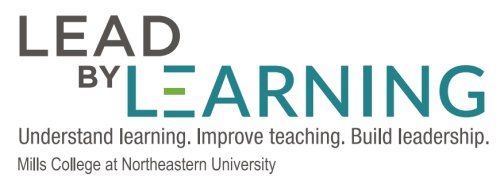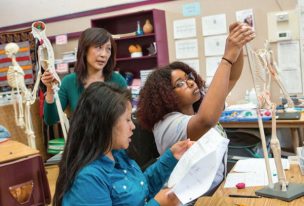Celebrating Our Teacher Leaders
“The Teacher Leader Network has helped me understand that being a professional is not knowing it all and dictating it out to others, but instead being a person who people feel comfortable sharing their own knowledge with and getting them into a space where it is ok for me to question them and nudge them to be their best. Teachers are comfortable with me coming into their rooms to observe/collect data. They seek me out to ask for help in their thinking. They try out the things that I suggest and they allow me to learn from them. I really think that they know that I value their knowledge too. I have also noticed that in working through Mills Teacher Scholars, others are now looking at me as a professional and my thoughts have become more valuable.”--Teacher scholar leader
The success of the Mills Teacher Scholars site partnership work is largely due to our dedicated teacher scholar leaders. It is the wisdom and deep experience of these teachers that guides the development of Mills Teacher Scholars and supports the work at school sites.

In early May we celebrated our teacher scholar leaders with a spring dinner. This photo features Alberto Nodal (Colonial Acres, San Lorenzo) and Nessa Mahmoudi (Melrose Leadership Academy, OUSD)
Whereas in eras past, “teacher leader” usually signaled a formal administrative role, our teacher scholar leaders align with current conceptions of teacher leadership, which extend the role beyond holding formal positions of authority within schools. Teacher scholar leaders lead their colleagues through an inquiry process that influences them to focus on student understanding and improve their practice based on what they learned.
This year teacher scholar leaders at our transitioning and sustaining sites (in which site work is facilitated entirely by teacher leaders supported by Mills Teacher Scholars) planned and facilitated monthly inquiry sessions for their colleagues, collected video, audio and observational classroom data for their colleagues. In addition they supported colleagues with:
- identifying an area of inquiry
- articulating the learning goal embedded in their inquiry
- selecting a routine instructional practice that addresses this learning goal
- identifying focal students (most teachers selected a range of focal students to more broadly impact their practice)
- collecting data that makes student thinking and learning visible within this instructional strategy
- collaboratively analyzing video data and using the data to articulate indicators of success for focal students
- articulating shifts in instruction based on new understandings
Teacher scholar leaders are supported in building their capacity to do this work in the Teacher Leader Network, a cross-district group of teacher scholar leaders from our partner sites. In 2014-2015 the focus of the Network was supporting colleagues to build data analysis skills. In the coming academic year the Network will focus on building the teacher scholar leaders’ adult coaching skills. The reciprocal learning that occurs at these sessions builds teacher scholar leaders’ capacity to support their colleagues at their school sites and allows Mills Teacher Scholars to create a teacher learning program that is responsive to the specific needs of the ever-changing context of schools.
What their colleagues say about the inquiry work that the teacher scholar leaders are facilitating
“The lead teachers (Kenny, Debbie, and Melissa) have done an excellent job in being very prepared for each meeting and focused in their purpose. They have offered to support us by giving up prep times, subs, and coaching if we want. They have brought in informative articles that relate to teaching and are thought provoking. They run a cohesive program, and also enter in and are actively participating with their own questions too.”
“Our teacher leaders are masterful at pushing our thinking and providing relevant examples for teachers to learn from.”
What our teacher scholar leaders say about their participation in the Teacher Leader Network:
“I feel like I have concrete tools for interacting with people from all facets of the education world – program specialists, administrators, school board members, etc. I feel much more well-rounded, like there was a gap before in my experiential discourse with other engaged educators (because that just wasn’t happening at my school before).”
“I think MTS is a great space to practice articulating your thinking about your teaching practice. In this way it has greatly contributed to my sense of professionalism. MTS makes me feel respected and as if my opinion is valued. I am put in a position of agency to say what I think would best support my own and my colleagues thinking.”
“This work has provided a space for me to feel like a professional who can make contributions to the overall teaching profession. The fact that this network calls for synthesis of learning, opening practice, presenting thinking, inviting colleagues to engage in meaning making, questioning, reflecting and planning really supports the development of a sense of professionalism in practice.”
“Since I am helping other teachers and planning and facilitating meetings, it has made me feel more confident in my own abilities. When I help other teachers with their inquiry question, I feel like I have something to contribute, which makes me feel as if I know something about teaching.”

